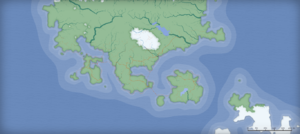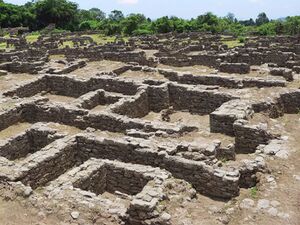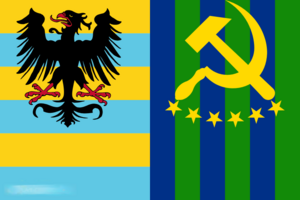Heldervin
This article is incomplete because it is pending further input from participants, or it is a work-in-progress by one author. Please comment on this article's talk page to share your input, comments and questions. Note: To contribute to this article, you may need to seek help from the author(s) of this page. |
Heldervinian Socialist Autocratic Reich Heeldermunschdein Sozialistischestuun Autokratischmein Reich | |
|---|---|
|
Flag | |
| Motto: "Sozialistenein von Heeldermunschdun, arbeitetuun!" "Socialists of Heldervin, work!" | |
 | |
| Capital | Old Vrebsicourg |
| Largest city | Ansium |
| Official languages | Heldervinian |
| Religion | Saletrism |
| Demonym(s) | Heldervinian |
| Government | Socialist two-party semi-constitutional monarchy |
• Lady | Marlene V |
• Heir Apparent | Marielle VII |
| Establishment | |
• Establishment of the first city-states | 18 January 294 |
• Unification of the Heldervinian City-states | 1 October 1836 |
| Area | |
• Total | 2,693,382 km2 (1,039,921 sq mi) |
• Water | 350,139 km2 (135,189 sq mi) |
• Water (%) | 13% |
• Land | 2,343,243 km2 |
| Population | |
• 2059 estimate | |
• Census | |
• Density | 376.56/km2 (975.3/sq mi) |
| Currency | Held (HLD) |
| Time zone | UTC+7 (Helderbu Time) |
| Driving side | right |
| Calling code | 74 |
The United Kingdom of the Heldervinian Socialist Autocratic Reich and Lorangburg, commonly known as Heldervin, is a country located in northern Ledonia, particulary in the Trihhimerein Peninsula, with parts of its territories found on the various islands in the region. Spanning across the majority of the peninsula, it is home to the oldest settlements in the region; however, the nation itself is relatively young, unified in 1836. Peninsular Heldervin is bordered by Berush to the north, Partin to the east, and the Great Heldervinian Ocean to the west and south. Heldervin's capital is Old Vrebsicourg, while other major cities include Ansium and Old Figerbün. As of 2059, the total population was 882,382,737.
Heldervinian terrain largely consists of low hills, plains, and rainforests. Mountainous terrain is typically found in the north, where the tallest mountain, Mt. Everlherst, is also located. Tuujarnia, a province in Heldervin, earned the title as most populated and dense due to the near zero hills and mountains found.
In late antiquity, the Berushian Peninsula was settled by Berushians, particularly the bourgeoisie. Heldervin became a unified state in 1836.
Etymology
The name of Heldervin originates from Heldervinia, the name used by the ancient Ledonians to identify the Trihhimerein Peninsula. The etymological meaning of the term Heldervinia is unclear, and as such the true origin of the name is largely speculatory.
The most popular theory is that Heldervinia means "Land of the Helds", due to the fact that, in the Ledonian language, the term "ervinia" as a suffix meant "Land of". However, there exists little historical evidence of such Helds.
History
Prehistory
Archaeological research indicates that the Trihhimerein Peninsula was populated by various tribes about 5000 years ago.

The two largest groups inhabiting the Berushian Peninsula were the Trihhimerein and Ecahoors. Several towns were established by the tribes, including Old Vrebsicourg, the oldest continuously inhabited settlement in Heldervin.
The Necargom culture arrived around 2200 BL, during which they established several powerful kingdoms and introducing various new weapons and foods. It was during this time that major Veterlitterumian monuments, such as Steinenwahrzeichein emerged.
From roughly 1800 to 1625 BL, the Thatckerians began an invasion
